Our bodies are no one's business but our own
These days I'm chased by a burning question: Can I be at home in my body, at last? I look forward to the day when "the work" of being in my body isn't work anymore: it's called living.
The Thanksgiving when I was 19, I came home to suburban Long Island from my women’s college in Boston. A freshman, I was heady with my newfound freedom and the discoveries I was making about myself as a young woman, a budding writer, a student, a friend, a girlfriend, a person in the world untethered from her family of origin. I described it at the time in my diary as “the two Amys, the two lives, the two homes,” the growing distance between the home where I’d grown up and the new home at college where I was growing myself up.
Not long ago, leafing through that 45-year-old notebook, I came across this account of my Thanksgiving homecoming and read a passage that made me sharply inhale. It brought back the long history of body shame and the reminder that I might find a home for my mind and my spirit—but would I ever be at home in my body?
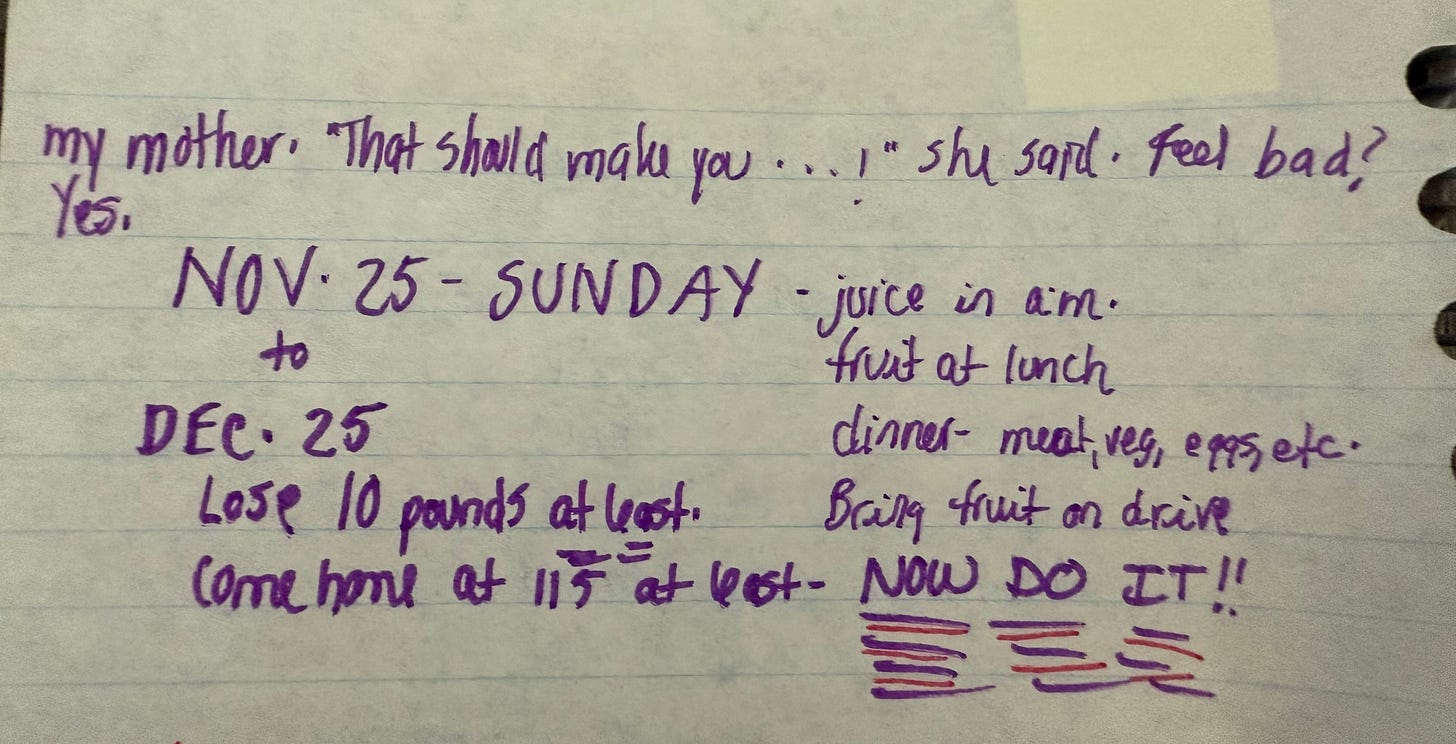
I remember this conversation with my mother and the shame once again surges in my body. I know she was well-intentioned. She wanted to gently but firmly nudge me back toward the societal mandate that female beauty equaled thinness. My mother was plump in her twenties and thirties, as a young bride and then mother of three. By 1979, when she was 43, she was following the Scarsdale Diet, the diet trend of the 1980s with its extreme calorie restriction. She got thinner and retained a slender figure on her petite frame for the rest of her life. My mother “watched her weight” from that point onwards. And I would never forget that my body was capable of letting down the person I trusted most in the world. Yet when I look at this photo of my mother in her early 20s, I see a woman in full possession of herself, joyful in her body. Oh Mom, I think, if only we could have accepted our bodies just as they were—nobody’s business but our own.
But of course she couldn’t offer me that. Inevitably, somewhere along the way, my mother succumbed to the same societal messages about women and their weight—that an overweight woman is less attractive, lazy, weak and unworthy in countless ways. And really, how could she not? It was and still is the water in which we all swim.
The forever dance of body acceptance
These days I am trying to get to a safer shore, one in which acceptance of my body is my work alone, with the goal being that one day it won’t be “work” at all, it will simply be the delight of living in this world with the great fortune of a healthy, whole body. A body that can walk, bend, run, skip, jump, hug, kiss, smell, taste and feel—a body open to sensation in every way that a body can be open.
There are moments, even entire days and weeks (like the glorious two-week 186-mile walk on the Camino de Santiago with my daughter Marielle) that I feel the gift of this body and vow to appreciate it and not denigrate it. I feel this elation in my body whenever I walk the beach, for the ocean is my happy place. I stretch my arms to the sky; I twirl and dance, not caring who is watching.
I want to be a good role model for my daughters, now 30 and 32. I want them to own their bodies in a way that their mother and grandmother could not and to embrace their healthy appetites—for food, for life, for everything they desire.
And then there are the moments when I stand in front a department store dressing room mirror, careful not to look in the mirror as I undress, and then turning to see if I can approve of my body in this outfit—if I can move past the critical voice in my head. This past weekend, I couldn’t. Mean girl me defeated any semblance of body positivity. She rejected everything I tried on, and dejected, I vowed to keep avoiding mirrors as much as possible. And the scale.
You see, I’ve abandoned weighing myself on a scale. I skipped my annual physical this year, not least because of the expectation I would have to step on the scale at the doctor’s office and that number was going to mean everything about me. It was going to hiss at me with a lecture that would grind on in my head all through the visit about my weakness and indulgences, followed by a pledge not unlike my 19-year-old self to acknowledge certain misbehaviors, to “clean up my act…NOW DO IT!”
I know that I am healthy and fortunate not to have any chronic illnesses (and I will remedy that postponed annual physical). But I am very tired at age 64 of finding fault with my body. In a piece on this subject last spring, I owned myself as “a woman of appetite,” but it seems I am now once again in a deprivation mindset. I still struggle with the question I posed in Living in 3D nearly a year ago about fitting our bodies into an ever smaller box: When will it ever be enough?
All these decades later, I am still trying to unravel how to make my body no one’s business but my own, to get the critical, self-hating voices out of my head. I am also aware of the unconscious bias I carry toward fat women (“fat” being a word that larger women are claiming for their own, no longer letting it be weaponized). At a restaurant recently a beautiful, large young woman was wearing white snug-fitting denim shorts over her tanned legs with complete assurance as she talked to her friend. I noticed my reflexive judgement and then looked at her again, this time, with admiration for the comfort she radiated in her own body.
And so I am still in the midst of the work of body acceptance. I am excavating the messages and modeling I received as a child and adolescent around weight, body image, about owning my wants and desires (most often paired with shame).
I’ve done enough Inner Family System (IFS) work to know that my inner child and inner protector (ego) are playing strong roles. It is perverse, but I believe there is a part of my inner protector who believes that maintaining the “extra” weight keeps me safe. She reassures me I don’t have to go out and date until I’ve lost some weight if I don’t feel “ready.” It’s a familiar pattern. I know the ups and down of the dieting and weight loss and gain rollercoaster. But I don’t know what it’s like to truly accept my body in a permanent way, no matter what I weigh.
When I talk to these different parts of me, there’s a chance to get off the rollercoaster. I can soothe and reassure younger Amy she is loved just as she is, and console protector Amy that I can settle into my body’s natural set point for weight and that even if it doesn’t meet an arbitrary societal standard, it won’t set me up for rejection, judgement and loneliness. Only then is it possible for adult Amy to step in and have compassion for this beautiful, loving, and caring person who happens to be living in a particular body on this earth.
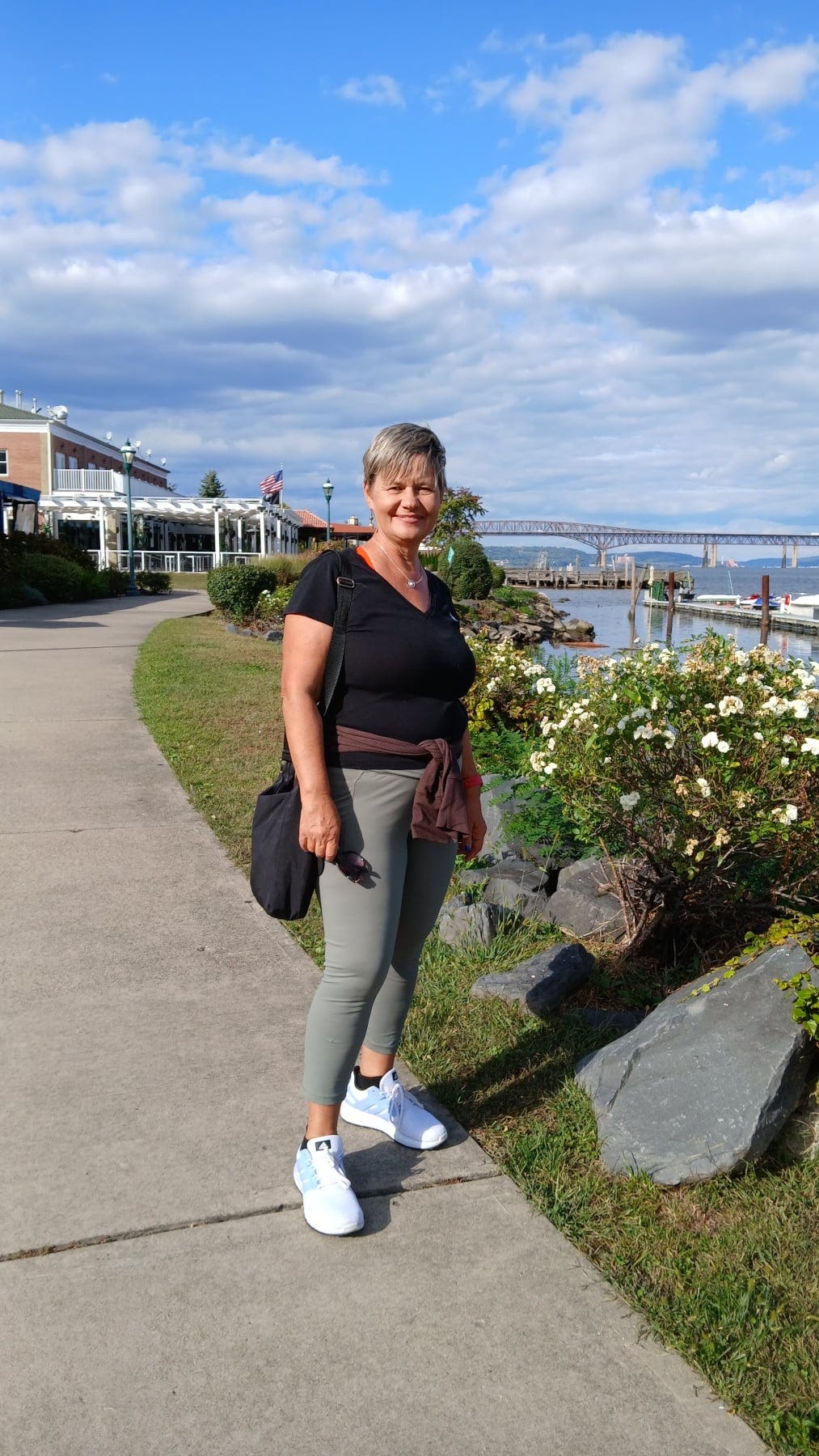
My soul is so much more than my body. So in answer to the question I posed at the start of this essay, can I be at home in my body? The answer is yes: when I can see that my divinity is beyond this human form. What a beautiful thing that is.
The story of my body
In March 2022, at a yoga therapy retreat, six months before I would initiate my divorce, we were asked to tell the story of our bodies but to write it long-hand using our non-dominant hand. Here is what emerged for me
A few days ago I added another entry, writing with my left hand in a notebook:
Divorce. Alone with my body. Getting to know its contours all over again. Taking my own hand with love and compassion, returning to the dance of acceptance.
Women talking about our bodies: We are not alone
Thankfully, I am not alone in this conversation—and you don’t have to be either. In my curious, knowledge-seeking, female-solidarity loving way, I’ve curated a list below of what I’ve been reading and listening to in recent weeks and months that have helped widen the lens on how I view women’s relationship to their bodies. I think you’ll find plenty of food for thought, here, too.
at
on her podcast “Where Does Fatphobia Come From?”: Moral philosopher and Cornell University professor Kate Manne, author of “Unshrinking: How to Face Fatphobia,” as much Kate’s personal story about living in a larger body, is a deep exploration of how we got to this point, with sometimes deadly results for fat women who don’t get proper medical care. This is among other biases larger women and people face in our society. I have reported about workplace weight discrimination: .I think there's a lot of assumptions in play here that a good body is a thin one, a thin body is achievable, a thin body is achievable for everyone, and that you will be fully in control of your health and your mortality if you're thin, which is also just of course a myth. There are plenty of fat, healthy, happy people, and there are plenty of sadly unhealthy, thin people who should not be regarded as any more or less worthy than a fat person who suffers from a similar health condition.”—Kate Manne
Kate exhorts us to throw out all scales—not just the scale on which we weigh ourselves but the scale we are constantly creating to judge bodies (body neutral, body positive, etc): “Why don't we regard our bodies as just for ourselves and nobody else, and they don't need any kind of assessment…I mean, better a positive one than a negative one…but the whole scale is really screwed up when you think about it. There just isn't a need to regard the body in this way, and I think it's really toxic.”
This conversation on Glennon Doyle’s podcast “We Can Do Hard Things” continues to reverberate, months later: Loving Your Body Changes Your Life with Sonya Renee Taylor. Author of The Body is Not an Apology, Sonya explores, among other topics, how to shift from a relationship with our body based on dominance and control to a relationship based on trust.
writes
, “real conversations and personal stories to help midlife women redefine health beyond diets and restriction, navigate perimenopause, and find liberation through radical self-love.” Check out these recent articles: Going fat in the time of Ozempic: “When I quit diets, I quit them for good. I knew that pursuing intentional weight loss would reinforce the same dangerous message society has fed us for years: that thinness equals value,” and Choosing love over fear in menopause in which Kristi writes how she is pushing past her fears “so I could find acceptance with myself and the body I was inhabiting in that moment. I wasn’t fully there yet, but I was doing my best to embrace my own new chapter.”Another great resource:
, devoted to “dismantling diet culture and anti-fat bias, especially in health, fashion, and parenting.”Last week,
wrote about her own disordered eating history and its relationship to her sobriety journey, “We All Have a Hunger,” in which she writes: “Sobriety can feel like a spin cycle. You think you’ve addressed a pattern and a compulsion and then it comes cycloning right back at you.” She offers four essayists on Substack who have written recently about this topic. Check it out!I also appreciate the writer
at who is bravely vulnerable about how disordered eating continues to be a struggle for her. She wonders: “Maybe it’s not something to be conquered. Maybe it’s not a battle at all. Maybe it’s about waving my white flag and surrendering to joy, to life.”The Daily: “A Turning Point for Ultraprocessed Foods.” And not least, let’s be real about the external forces that contribute to weight gain that has nothing to do with our willpower because the food industry has long used food chemistry to manipulate and poison us. Guess who showed them how? The tobacco industry.
An anthem to our worthiness that I return to again and again on my beach walks:
If you like what you read, please leave a heart ❤️, a comment or restack for others to find their way here. Recommendations from other Substack writers are so appreciated! Special thank you to my paid subscribers. If this space brings you value, and you have the means, please consider upgrading your subscription. And if you’d like to make a one-time contribution of any amount to show your support, click on the button below. Thank you!





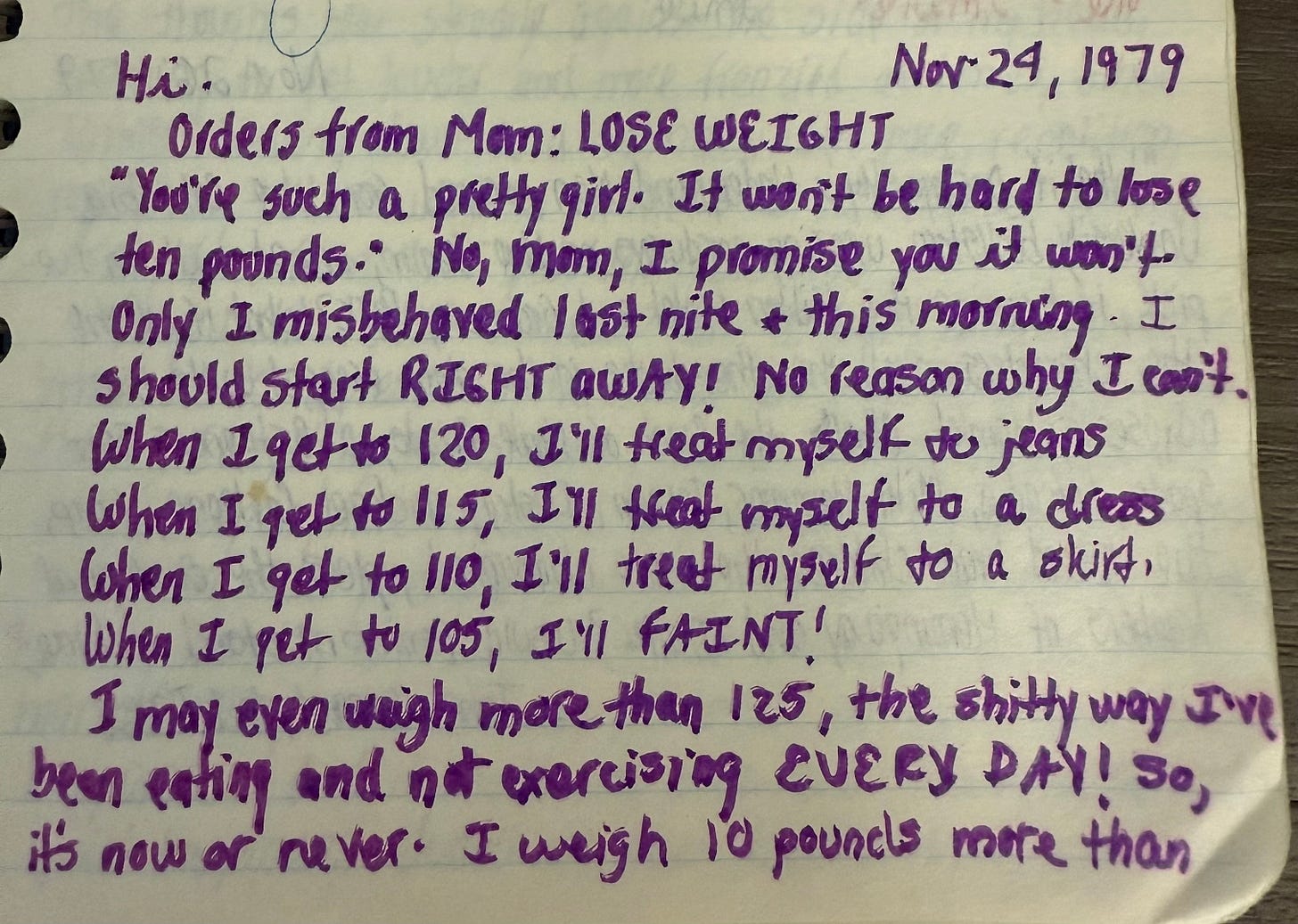
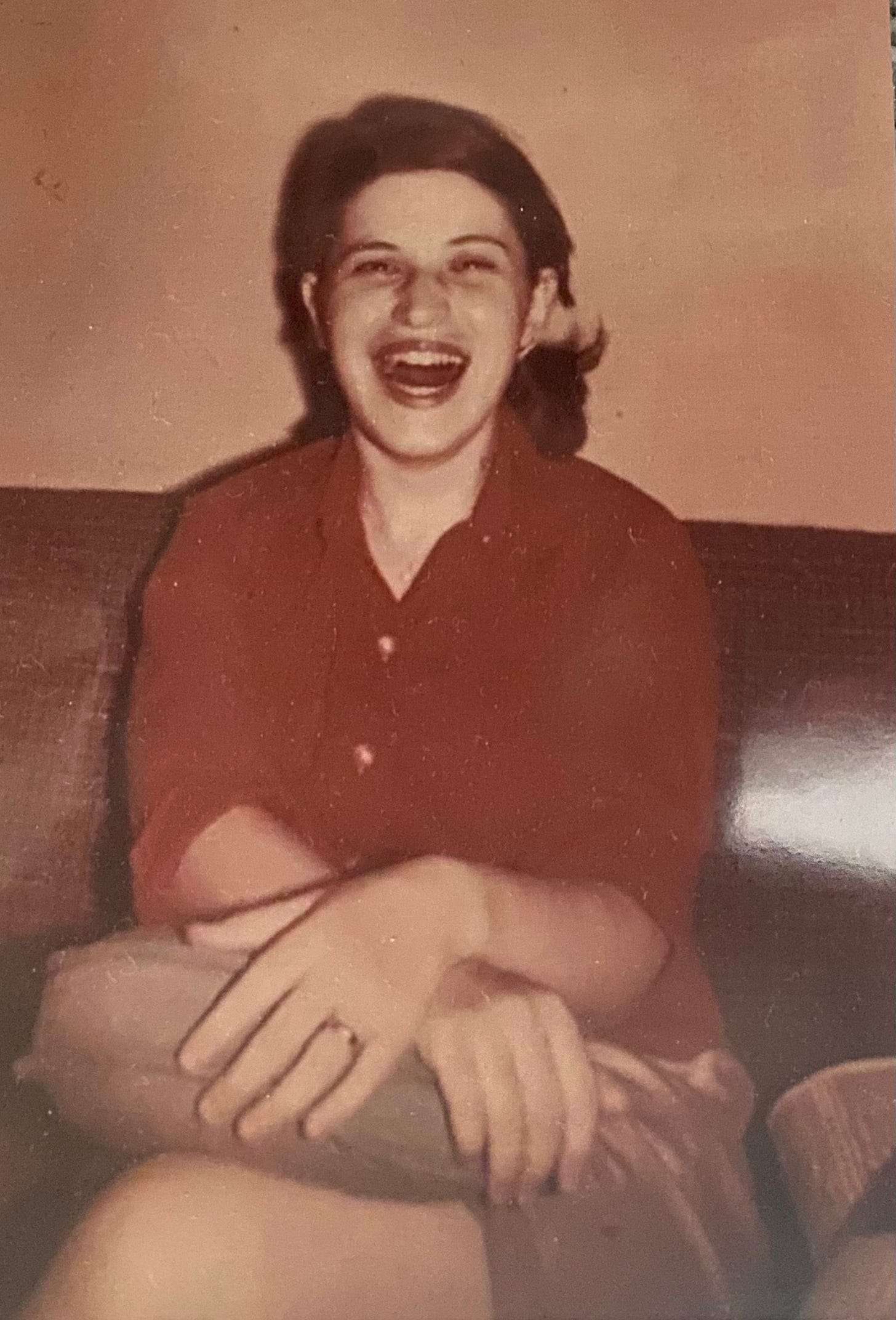

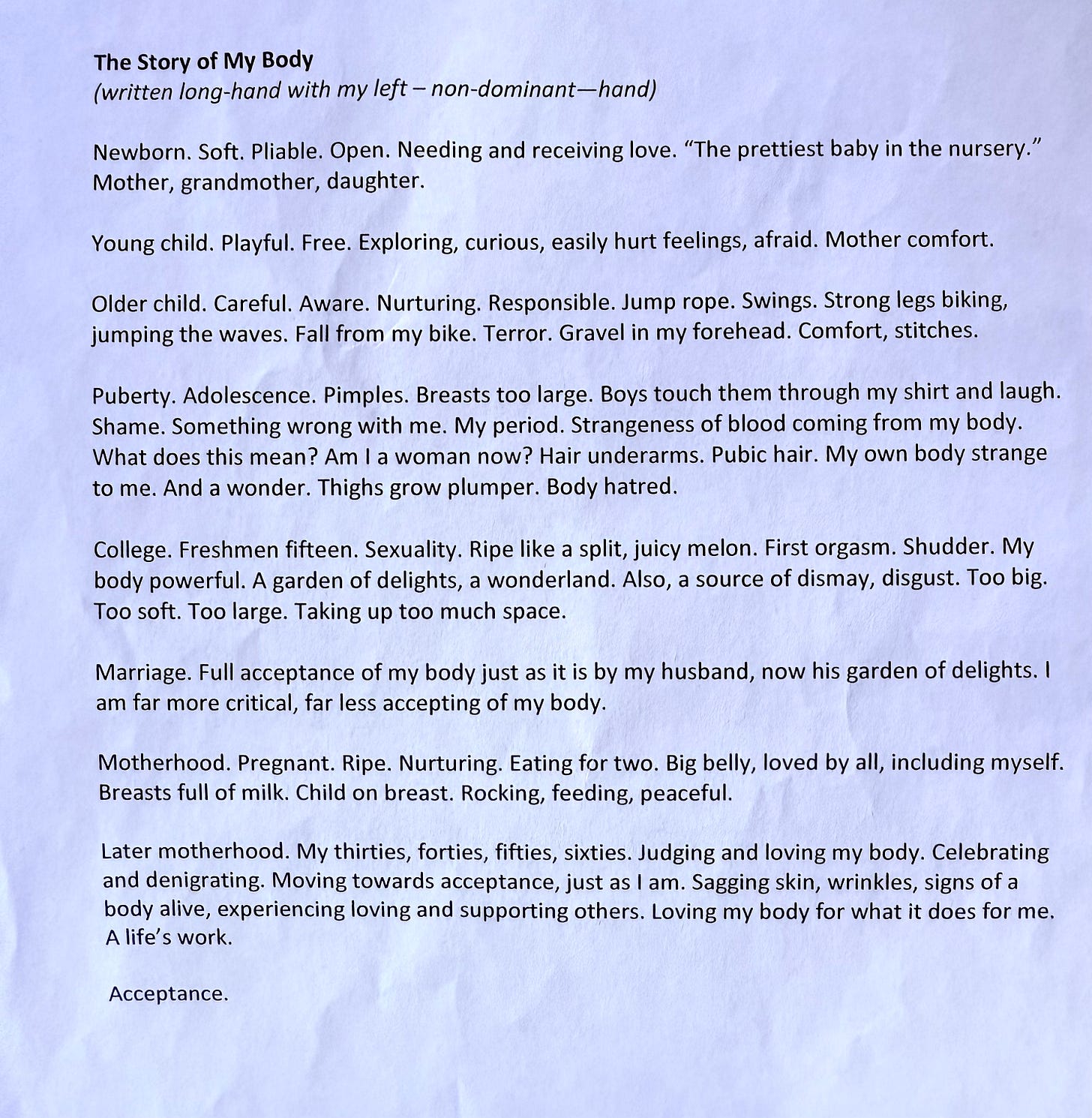
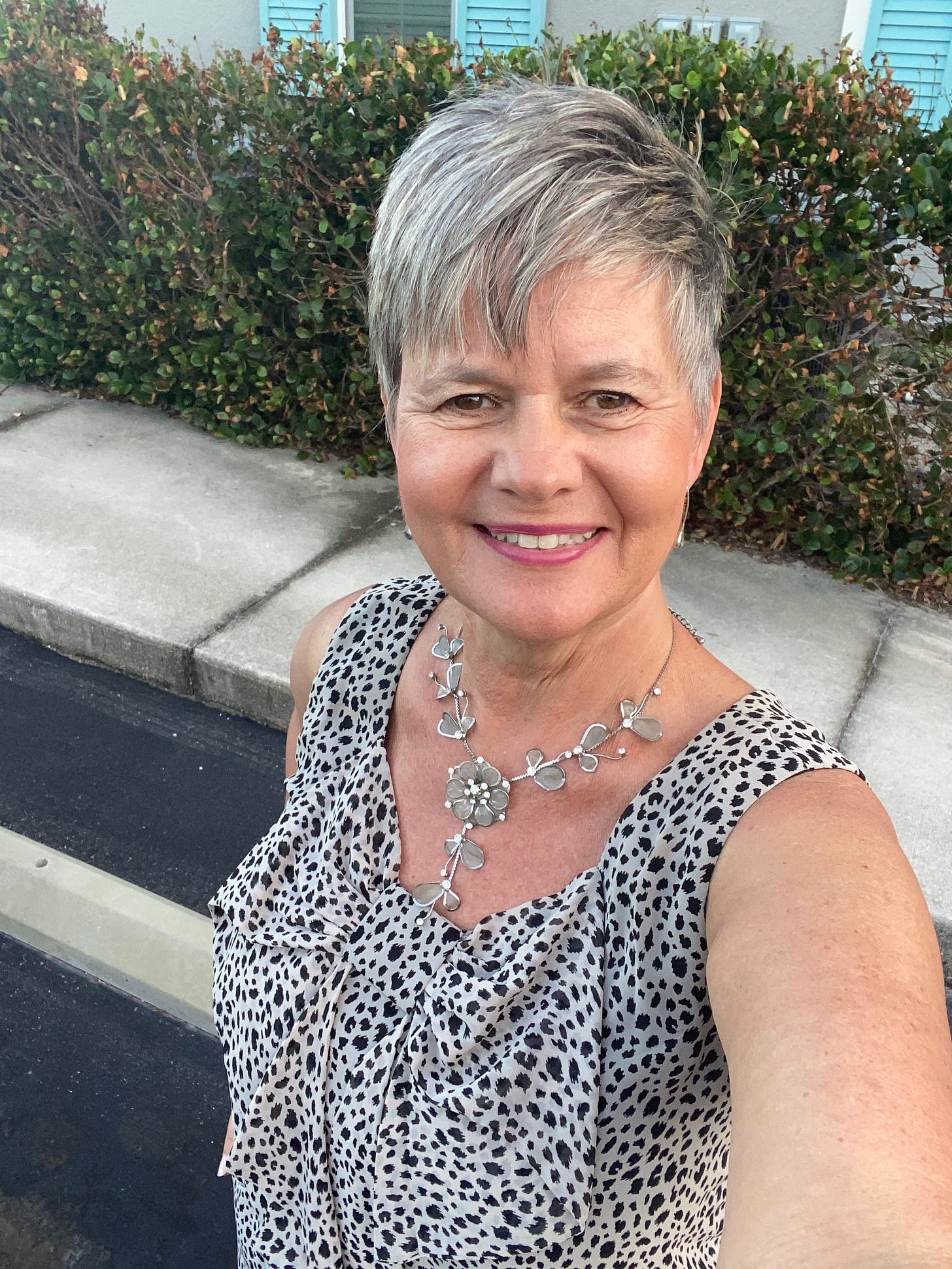

What a beautiful piece Amy! Firstly, I think you are freakin gorgeous and I’m so excited for the journey you’re on! As for our bodies… it makes me sad (and angry) that this continues to be such an issue with women. Women’s bodies are judged in a way men’s never are. I’m raising two daughters as well so trying to be a healthy role model. This might surprise some, but I never owned a scale and I don’t weigh myself. All I know is how I feel in my clothes. I’ve always led an active life and ate healthy. Not for thinness, but for strength! Around my forties the same tricks (healthy diet, movement and moderate exercise) stopped working and I began developing a belly, and with it- shame. Last year when I finally learned about menopause and hormones I was able to make a few adjustments that didn’t feel punitive or harsh. I lost the belly fat and became strong in my body. I am now able to do yoga poses I couldn’t in my twenties! But - I was rather upset that the comments I received from my dearest female friends (who were supposed to know better) was: “look at you disappearing!” I was shocked and hurt. I associate “disappearing with eating disorders. This wasn’t at all my goal. As a yoga teacher, encouraging people (especially women) to take up space is central to my teaching!! My aim was to get stronger so I can take active space in my life, with more energy!
Thank you for all the links. I will follow them. But one thing I still hope that we can address is women’s attitudes towards other women’s bodies. A lot of these harsh judgments about our bodies actually come from women, not men. I’m thinking how Adele and Rebel Wilson were shamed when they lost weight. I’m pointing this out because we are more familiar with “fat phobia” but don’t discuss the other extreme end. What makes me infinitely sad is that whether we are “too fat” or “too thin” we women can’t win. Our bodies will be judged. And often, by other women. So maybe we should stop playing into this? Sorry, this has become a long comment…
Oh, Amy. That passage from your journal at the tender age of 19 coupled with this sentence: "And I would never forget that my body was capable of letting down the person I trusted most in the world." I had to pause and sit with what that brought up in me. Wow I feel that.
I was raised by a hard-working single mom who always fought against her size. When I was a young girl, she would bring me with her to Weight Watchers and I would gaze at all the women lined up to step on that scale, stripping down their garments and jewelry in the hopes that the numbers went down instead of up. Moods being dependent on which direction that number went. Having a front row to that had such an impression on me. I battled the scale for decades.
I no longer place my body on the scale but there's always a reel of comparative images in my mind - at this time last year, I was able to wear that outfit and it's too tight now. Or when images pop up as memories on my phone, I instantly compare my size in that photo with today. Every time. I don't need a scale to shame me. I do it fine on my own.
Comparison is the thief of joy, as they say, and even more is robbed when we are comparing ourselves with past versions of ourselves. The "I could do it then why can't I now" litany of inner dialogue.
I am so thankful that you and other gorgeously gifted writers and putting this down on the page. We don't need to hide this from conversations.
I am getting better about it - because I am exposing it to the light. Airing it out. Getting curious about the patterns and asking compassionate questions.
You, my friend, are radiant in those photos!
Thank you for the mention and, once again, we are synchronous in where our pen takes us. xoxoxo